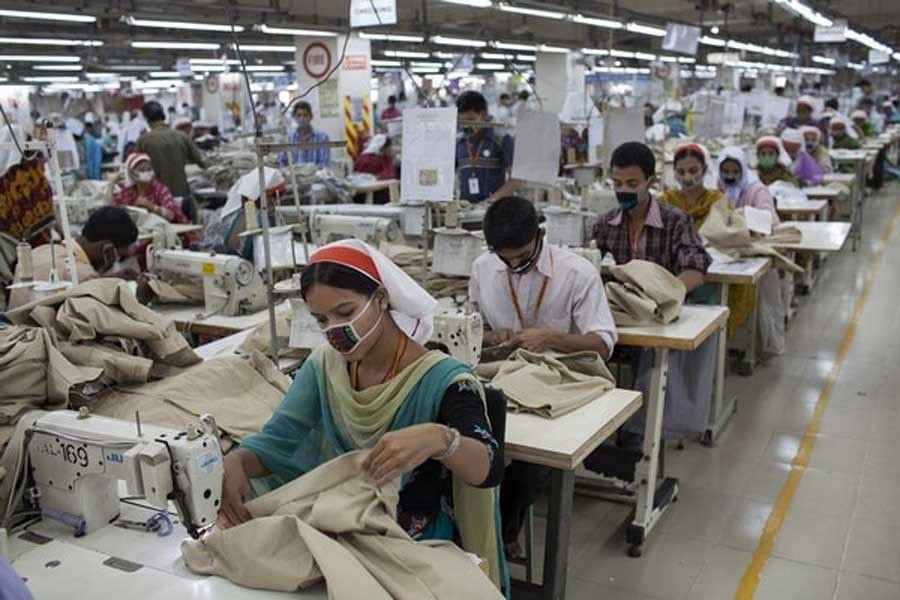Aggrieved workers are filing a rising number of complaints with the government’s relevant department, indicating a deficiency in decent work culture in the country.
The Department of Inspection for Factories and Establishments (DIFE) received a total of 5,236 complaints in the 2020-2021 fiscal year, compared to 2,945 complaints lodged with it the year before and 2,755 FY 2018-2019.
The number of lawsuits the department filed with different labour courts in 2020-21 was 1,421, of which 490 were settled.
The most common complaints are relating to wages and payment of wages, leave, overtime payment, workplace harassment and violence and job termination without following proper rules and provisions.
Official records say 54 workers died and 33 others were injured in the past financial year (2020-21).
“Scope for ensuring atmosphere for decent work is limited for the DIFE,” a senior official of the department told The Financial Express. The official explained that the Bangladesh Labour Act, 2006 has the provision to fine an accused with only Tk 25,000 maximum.
In such a situation, the department filed lawsuits for a variety of charges that include violation of conditions of employment and services, hiring children and adolescent workers, maternity welfare benefits, occupational health and safety, occupational accident, compensation and safety committee, welfare measures, working hours and holidays, wages and payment of wages, social security (group insurance, provident fund, and profit sharing), discrimination, and violence at the workplace.
The number of cases filed was 1,667 in 2019-2020 and 1,370 in 2018-2019. Of them, about 62 per cent (61.61 per cent) were settled, show official data.
Decent work has been defined as “productive work for women and men in conditions of freedom, equity, security and human dignity”, according to the International Labour Organization (ILO). Fair pay, secure employment, safe working conditions, equal opportunities, social protection, personal development and freedom of expression are considered as elements of decent work.
Only 10 per cent (9.51 to be accurate) of the department’s labour infections of factories are meant for the apparent sector, the highest employer.
However, there are more concerns about the state of labour welfare in the informal sector as thousands of workers are in peril.
“A large number of unregistered and unlicensed factories makes it a herculean task to ensure compliance with rules,” the senior official of DIFE said, adding that some employers and employees alike are ignorant of rules that ensure decent work.
In Bangladesh, 87 per cent of the labour force is engaged in the informal economy, according to the 2010 Labour Force Survey. The workers include wage labourers, self-employed persons, unpaid family labour, piece-rate workers, and other hired labourers.
Professor Md Salim Uddin, Department of Accounting of the University of Chittagong, said both male and female employees in the informal sector can be abused as there is no oversight body and regulations in the sector
According to DIFE documents, a total of 34,243 factories were registered with DIFE. As of June 2019, the number of people employed with those factories was 5,697,868 –3,651,183 males and 2,046,685 females.
The following year, the department issued licences to 8,455 factories and establishments and renewed 25,176 licences.
Most of these factories (17,069) are located in the Dhaka division, followed by Rajshahi, Mymensingh and Khulna.
A 2013 Economic Census conducted by the Bangladesh Bureau of Statistics (BBS) found the number of economic units in Bangladesh to be 8,075,704 but not all of these units fell under DIFE’s jurisdiction.
Child labour and worsening working conditions for many domestic workers have remained a major concern.
Of the 30,313 child labourers who were employed in hazardous jobs, nearly 7,800 switched to more hazardous jobs between July and September 2020 in eight districts, according to a survey conducted by Manusher Jonno Foundation.
A study by the South Asian Network on Economic Modeling (SANEM) said nearly 92 per cent of working women are involved with the informal sector. Only 31 per cent of women are wage employed, while 29 per cent are still unpaid family workers, it said.
Officials said the department is regularly inspecting and monitoring the factories, shops and establishments to ensure a decent work atmosphere.
So far, a total of 47,361 were inspected by the DIEF inspectors in the past fiscal year (2020-2021).
DIFE Inspector General Md. Nasir Uddin Ahmed, in an annual report, said the department performs its duties as defined and determined by the Bangladesh Labour Act, 2006 in order to establish a healthy work culture and improve the lives of workers.
“Nevertheless, DIFE needs to work more to ensure a decent and safe workplace in factories and establishments, as well as at its own institutional level,” he added.


